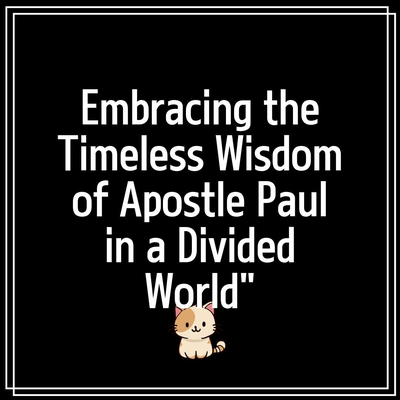
The Insights of Apostle Paul in Today’s Context
In the realm of theology and spirituality, few figures embody the essence of perseverance and faith as profoundly as the Apostle Paul.
Recent discussions surrounding Apostle Paul have surfaced in both religious and secular settings, exploring how his teachings on spirituality, community, and personal growth can be applied in today’s world. Understanding his contributions is not only vital for theologians but also for anyone seeking to foster a meaningful life.
Lessons from Apostle Paul’s Life
The narrative of Apostle Paul, born Saul of Tarsus, is one of transformation—a radical journey from a persecutor of Christians to a stalwart advocate of the message of Jesus Christ. This transformative experience is a clarion call for
Paul’s writings, which form a significant portion of the New Testament, delve into the concepts of grace, love, and what it means to live in community. His letters, often addressing the early Christian churches, maintain their relevance as they encapsulate fundamental truths about human relationships and personal ethics.
The Relevance of Paul’s Teachings
One of the most pertinent teachings of Paul pertains to the idea of
Furthermore, Paul emphasizes the importance of love as a guiding principle in every interaction. His famous discourse in 1 Corinthians 13 on love’s characteristics—patience, kindness, and selflessness—holds a mirror to the quality of our relationships today. Love, as extolled by Paul, transcends mere emotion; it is an active commitment to the well-being of others, an ideal severely needed in an increasingly individualistic society.
Addressing Modern Challenges
Theological discussions often pivot to the moral and ethical dilemmas faced in the modern age, such as the environmental crisis, systemic inequality, and the fallout from technological advances. Paul’s teachings encourage resilience in the face of adversity. His letter to the Romans addresses suffering as a pathway to hope—a theme that resonates with young activists and social leaders fighting for change today.
The Role of Community in Paul’s Vision
Central to Paul’s philosophy is the concept of community. For Paul, the church was much more than a gathering; it was a close-knit family united by shared faith and purpose. The modern interpretation of community can take several forms—religious institutions, communal living arrangements, or networks of social support—but the underlying message of collaboration and support remains unchanged.
In a world where isolation is common, understanding the value of community as advocated by Paul is essential. Actively participating in community life fosters a sense of belonging and significantly contributes to personal well-being.
Conclusion: Embracing Paul’s Legacy
The insights of Apostle Paul continue to inspire and challenge us, urging us to consider how we live our lives in relation to others and our broader responsibilities to the world. His teachings about love, community, and resilience reveal paths for not only personal growth but also societal improvement. As we grapple with contemporary issues, we can turn to Paul’s legacy as a rich source of guidance and encouragement.


